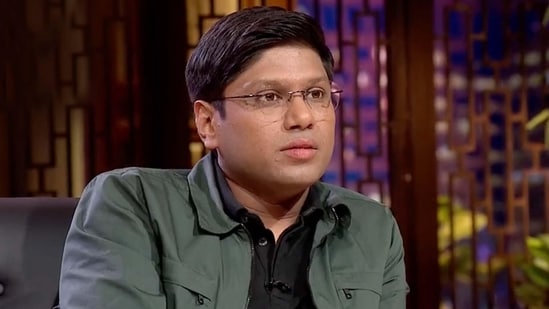Peyush Bansal’s net worth could rise to $1 billion with Lenskart IPO planned for next month, Bloomberg reported on Friday, underscoring wealth creation by new-age startups in the world’s third-largest stock market.
Lenskart Solutions Pvt. Ltd., the biggest eyewear retailer in the world’s most populous nation, is planning to list in November, targeting a valuation of $9 billion based on the IPO size, according to people familiar with the matter and calculations from the prospectus.
That would value Peyush Bansal’s stake in Lenskart at about $800 million after selling some shares in the IPO, according to the Bloomberg Billionaires Index. His net worth can cross $1 billion if Lenskart’s share price rises about 25% on listing day.
Lenkart’s, and by extension Bansal’s, path to an IPO shows how investor confidence is returning for some founder-led ventures after a period where the country’s leading startups struggled to survive and funding dried up.
Lenskart has carved out a niche with robotic production in India. The firm uses machines imported from Germany to produce its glasses, along with a website that makes it easy for customers to order and test their purchases remotely.
The company is already expanding across Southeast Asia where Bansal notes demand patterns in Indonesia and Vietnam mirror India’s trajectory a decade ago.
The Lenskart Story
“India is the myopia capital of the world, a lot of our people need glasses,” Bansal told Bloomberg News in an interview in Mumbai. “If we can solve that, everything else—including scale, profit and rising market capitalisation—will follow.”
Bansal’s pitch is that Lenskart stands apart from earlier Indian startup listings and already makes money. The Gurugram-based company—which designs, manufactures and sells eyewear online and through retail outlets—reported its first-ever full-year profit in the year to March 31.
Shark Tank
He’s also got the tailwind of an established retail fanbase behind him. Outside of Lenskart, Bansal is a judge on the Indian franchise of the American show Shark Tank and has amassed more than 900,000 followers on Instagram.
In business, he says he has benefited from timing and persistence. Bansal jokes that he and co-founder Amit Chaudhary spend one day every week brainstorming new ideas, with mixed results. “Our hit rate is about 50%,” he said. “A coin toss might have worked just as well.”
This year, he’s contended with a stock debut buffeted by trade wars and geopolitical headwinds in addition to more wary investors.
Startup IPOs in India
While India’s startup scene is one of the world’s largest, valuations have nosedived for several companies that struggled to grow and as investors ask tougher questions.
The family office of Infosys co-founder Narayana Murthy recently pointed to steep discounts driven by funds that need to exit their investments.
Oyo Hotels, which like Lenskart is also backed by SoftBank Group Corp. was once among India’s most valued startups, worth $10 billion in 2019 before its valuation nosedived and later recovered.
Bansal’s approach has drawn backing from investors who prefer patience over flash. SoftBank, which owns about 15% of the company, has described its stake in Lenskart as an example of patient capital that can wait decades for compounding growth. Earlier this year, investor Fidelity Management & Research valued Lenskart at $6.1 billion.
Lenskart IPO
The Lenskart IPO will test whether the rebound in investor appetite for Indian consumer-technology stocks has staying power.
Urban Company Ltd.’s blockbuster debut last month, which saw shares of the rent-a-service marketplace surge 62% on opening day, rekindled optimism after a string of disappointing post-market performances from other startups had cooled enthusiasm for the sector.
Lenskart plans to use the IPO proceeds from the share sale to open new stores across India, invest in technology and artificial intelligence capabilities, make acquisitions, and fund general corporate purposes, according to filings.
As of March, it operated 2,723 stores — across India and in markets such as the Middle East and Southeast Asia. Nearly 40% of its revenue now comes from outside India, underscoring its growing international footprint.
Still, Lenskart remains dependent on China for more than one-third of its purchases, including frames, moulds and raw materials, a reliance Bansal acknowledges but describes as manageable. Such dependence leaves the firm exposed to China’s supply-chain swings, where tariffs or export curbs could hit deliveries and erode margins.
Now Bansal is overseeing production of a new manufacturing facility in Hyderabad, which is expected to be the world’s largest, covering 50 acres with a production capacity of hundreds of thousands of glasses daily.
First Ventures
A graduate in engineering from McGill University in Montreal, Bansal began his career at Microsoft Corp. in Redmond, Washington, before returning to India to pursue entrepreneurship. His first venture, a student-housing app, gave way to a broader mission after he recognised a much larger gap in vision care. From a small office in Faridabad, on the outskirts of Delhi, he and three partners he met on LinkedIn began building Lenskart.
The company now controls nearly every link in its value chain, from lens design and manufacturing to last-mile delivery.
It employs hundreds of ophthalmologists in Kolkata who provide remote eye consultations and is developing AI-based testing tools to reach smaller cities where eye care access remains limited.
Its next big bet is smart eyewear. A 70-member team is working on integrating features such as UPI, AI tools, cameras, and headphones.
“It’s tempting to go all in,” Bansal said. “But timing matters.”
